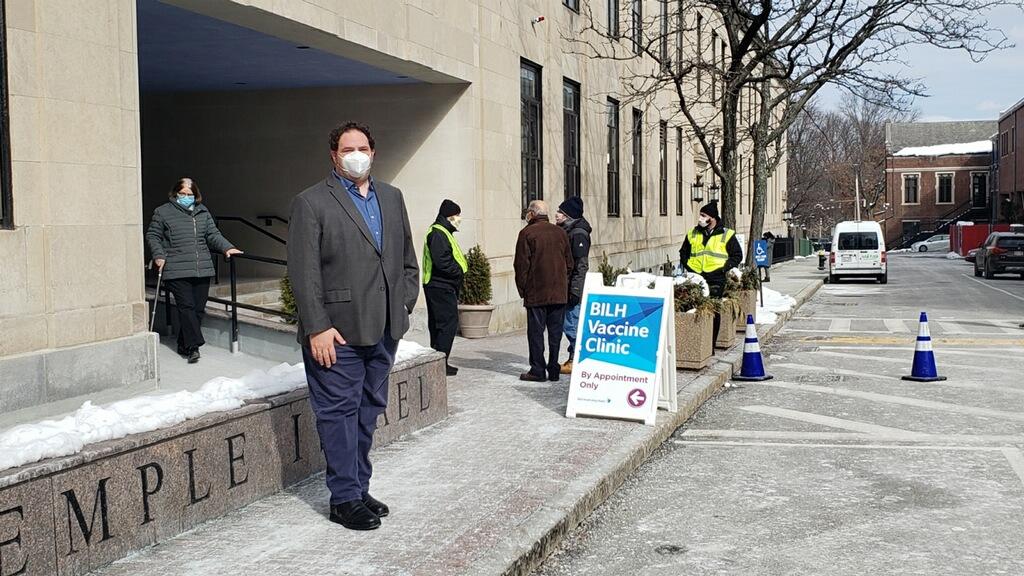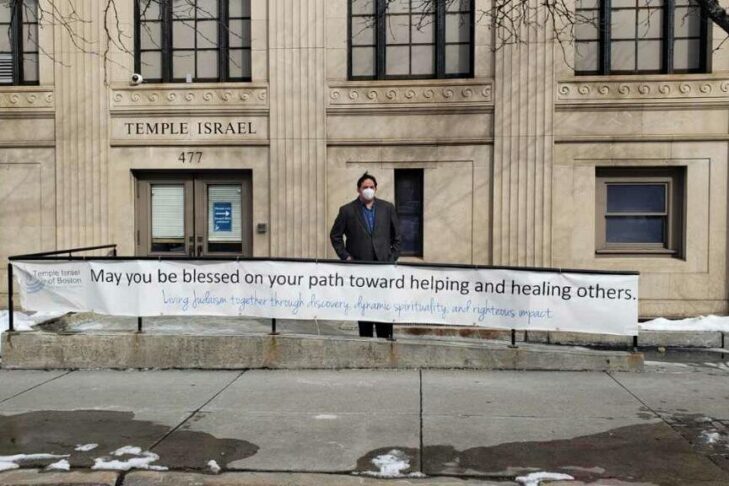In a unique partnership with Beth Israel Lahey Health, Temple Israel of Boston is serving as a COVID-19 vaccination site.
“To our knowledge, we are the only synagogue in Boston and Massachusetts that is a vaccination site,” Temple Israel executive director Dan Deutsch said.
Deutsch estimated that 6,000 people have already been vaccinated at the temple since it opened its doors in that capacity on Jan. 25. Those vaccinated include both Jews and non-Jews.
“It means a lot to us to be able to greet our members and non-members [and] be here for this experience,” Deutsch said. “The patients [Beth Israel is] sending are the most at-risk members of our society.”
Temple Israel is a closed site, meaning that vaccinations there are not open to the general public, just for existing patients at Beth Israel, and by appointment only.
“Quite a few members have come through,” Deutsch noted. “It’s amazing to see the connection between people with an affinity to both organizations.”
This includes members of the congregation making their first visit back since the temple shut down last year due to the pandemic.
“One man said to me he was coming [back] to Temple Israel, [which] was at a different location at the time [of] his bar mitzvah,” Deutsch said. “Now he’s in his 70s. He said how amazing it was to be there with his wife and get vaccinated. He had prayed in the building, had conversations in the building. That Temple Israel is now a vaccination [site] was a profound experience.”
Beth Israel had previously been offering new appointments for its patients but recently had to suspend this due to a change in state policy. Vaccinations at Temple Israel are currently open only to Beth Israel patients who have already scheduled or confirmed appointments through the hospital, according to a temple spokesperson. The spokesperson expressed hope that the temple can continue serving as a vaccination site as planned. Temple Israel’s original agreement with Beth Israel runs at least through May.
This is not the first time that Temple Israel has aided Beth Israel during the coronavirus response. Last April, Deutsch was participating in a call between Beth Israel and other local institutions in the Longwood medical area. The hospital was looking for additional places to store extra supplies arriving by truckload, from hospital beds to ventilators to personal protective equipment.
“My background is originally supply chain management,” said Deutsch, who has an MBA from Northeastern University. “I used some of my past skills and knowledge to figure out how Temple Israel could pivot.”
It helped that the temple had gone remote due to the pandemic. It also helped that there were “a couple of huge spaces [inside] that might work out,” Deutsch said, and for a few months, the temple served as a much-needed storage space.
More recently, Beth Israel reached out with another request, for 12 local pop-up vaccination sites lasting about several months.

“They approached us,” Deutsch said. “They were looking to keep it in the neighborhood.”
The temple stepped forward once again.
“Part of what made this site attractive for Beth Israel is that we are just a five-minute walk away from the Green Line Longwood T stop,” Deutsch said. “It’s really important to Beth Israel to have public transportation options for their sites when possible.”
The temple also has an adjacent parking garage that it’s partnering with for people driving themselves or taking Uber or Lyft.
“There has been a coordinated effort by one dozen different organizations to orchestrate all this, many moving pieces all coming together,” Deutsch said.
He noted that whereas the snowfall last week caused schedule alterations at larger vaccination sites like Fenway Park and Gillette Stadium, “we were able to stay open, right on schedule, with all the snow thus far.”
When patients check in at Temple Israel, they go through a health screening before proceeding to the Levi Ballroom, which normally serves as a function hall and worship space. Now the ballroom has 10 kiosks set up, where nurses are waiting to administer the vaccine and monitor any adverse effects from the shot.
In response to a follow-up email about which vaccine is being used at the temple, Deutsch wrote: “When we originally signed on to work with Beth Israel, they informed us that our site would have either Moderna or Pfizer depending upon availability. I’m only aware of the Pfizer vaccine being used at our site thus far.”
Both vaccines require two shots, and appointments are scheduled several weeks apart.
Masks are mandatory at the temple, and capacity during vaccinations is well below the 100-person state maximum, Deutsch said.
Vaccinations are generally held daily from about 9 a.m. to 8 p.m., although the schedule leaves time for holidays and Jewish lifecycle events, such as a 3 p.m. closure on Fridays for Shabbat. Clergy use the temple for Shabbat, while b’nei mitzvot are held on Saturday mornings, although the temple remains closed to the general public throughout.
“To our knowledge, we are the only site in our area that shuts down early for Shabbat,” Deutsch said. “We’ve had great conversations with a couple of nurses who are not Jewish and could get behind the notion of Shabbat, [and] how amazing it is to make Friday different as you approach the weekend.”
Just over 100 years ago, Temple Israel volunteered to help its city and community during another pandemic—the Spanish influenza outbreak of 1918.
“Our sisterhood group did quite a bit of work here taking care of the sick,” Deutsch said. “We played a role in the last significant pandemic … It’s part of what makes us feel OK to step forward and really be a part of the solution this time.”



